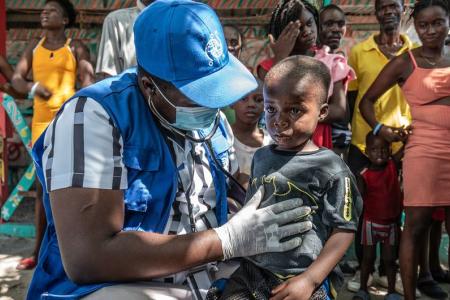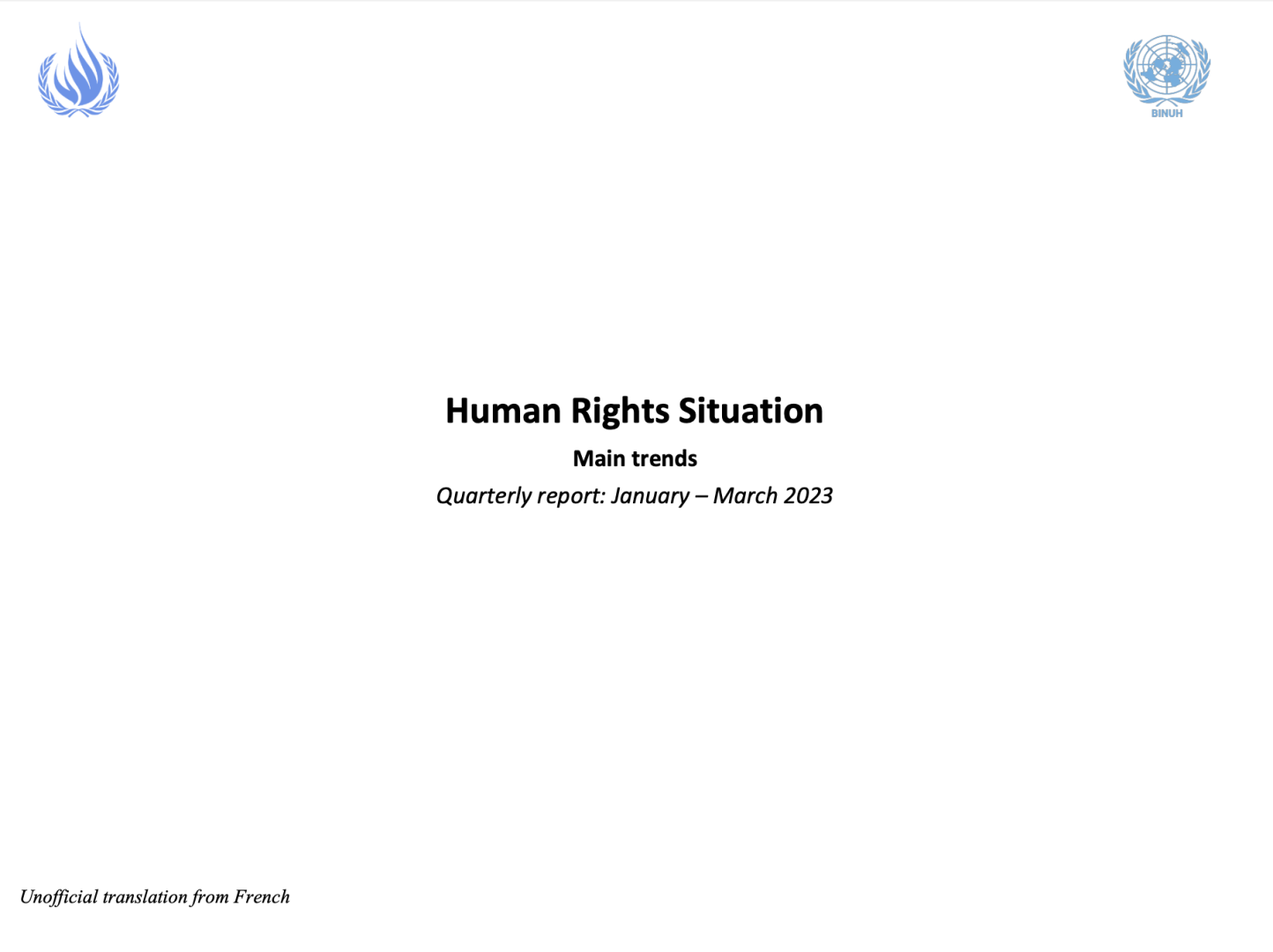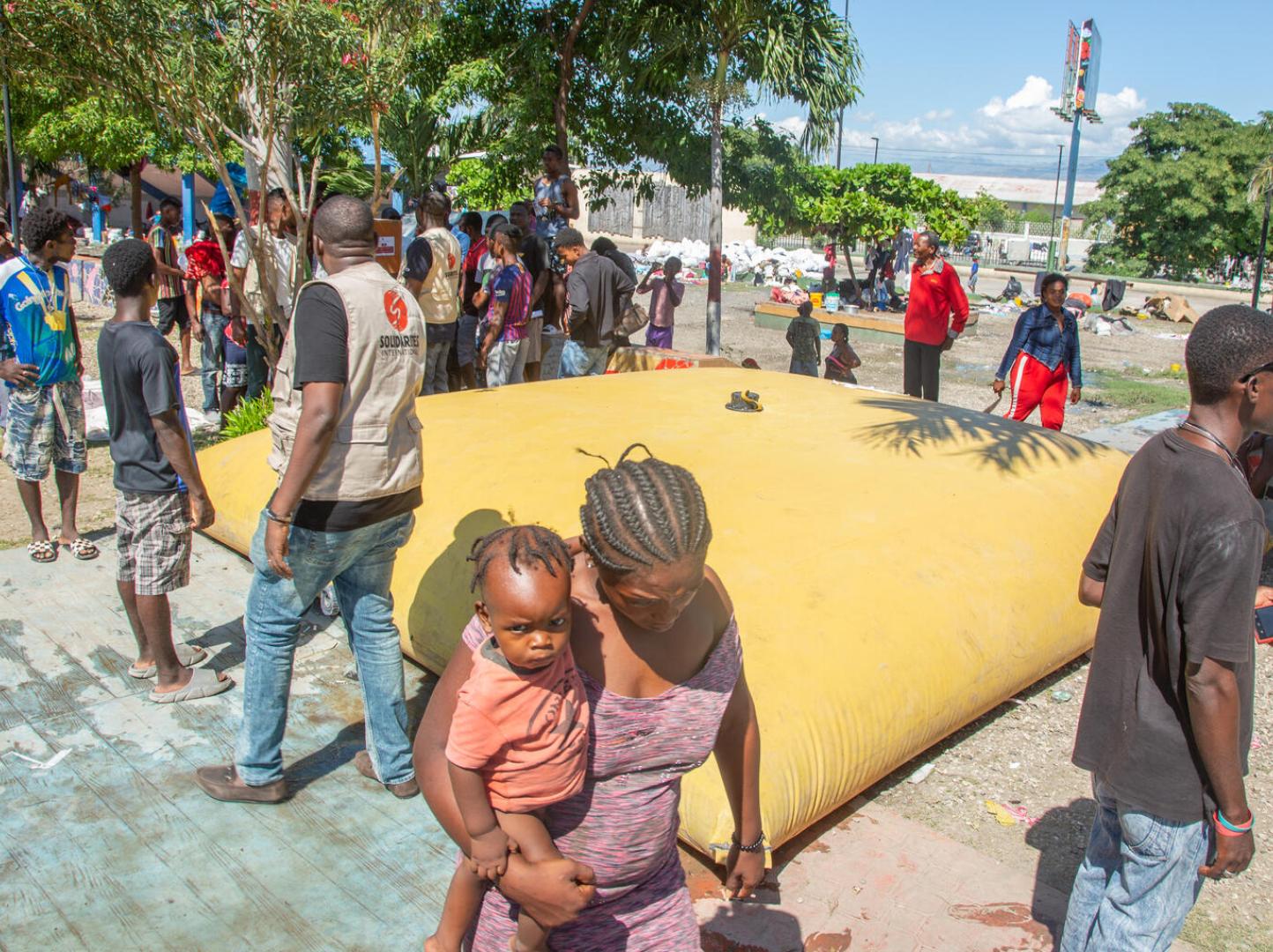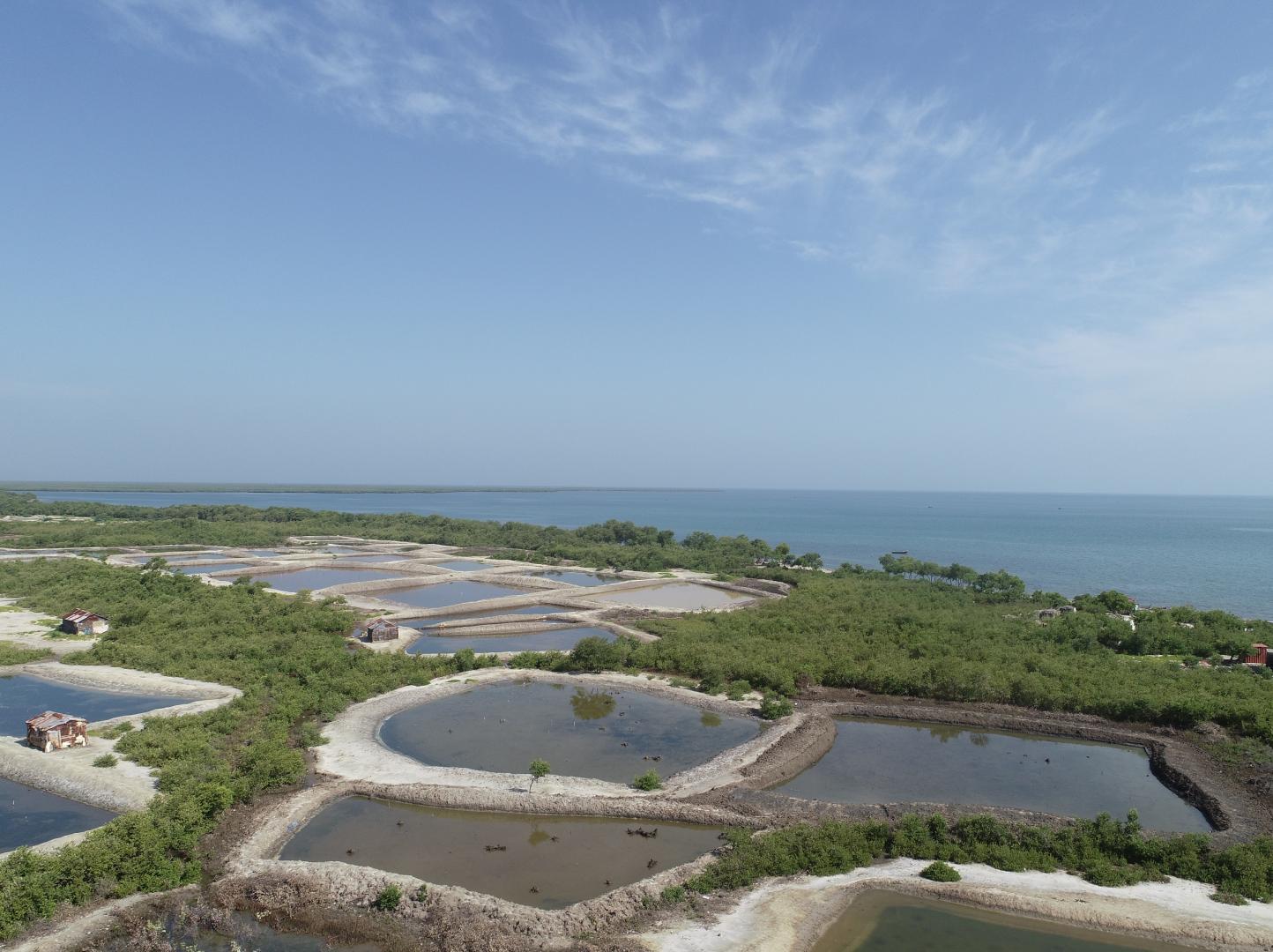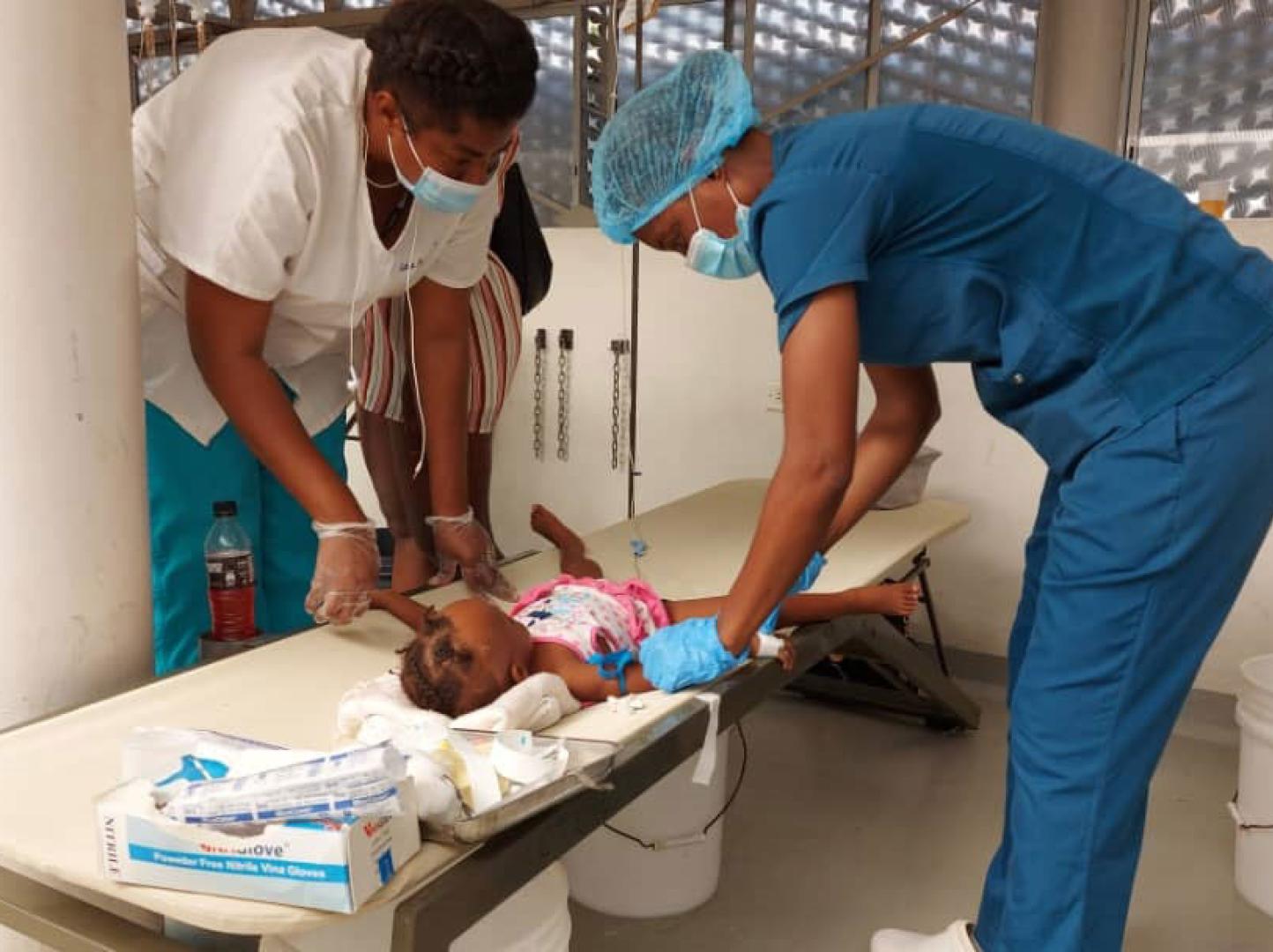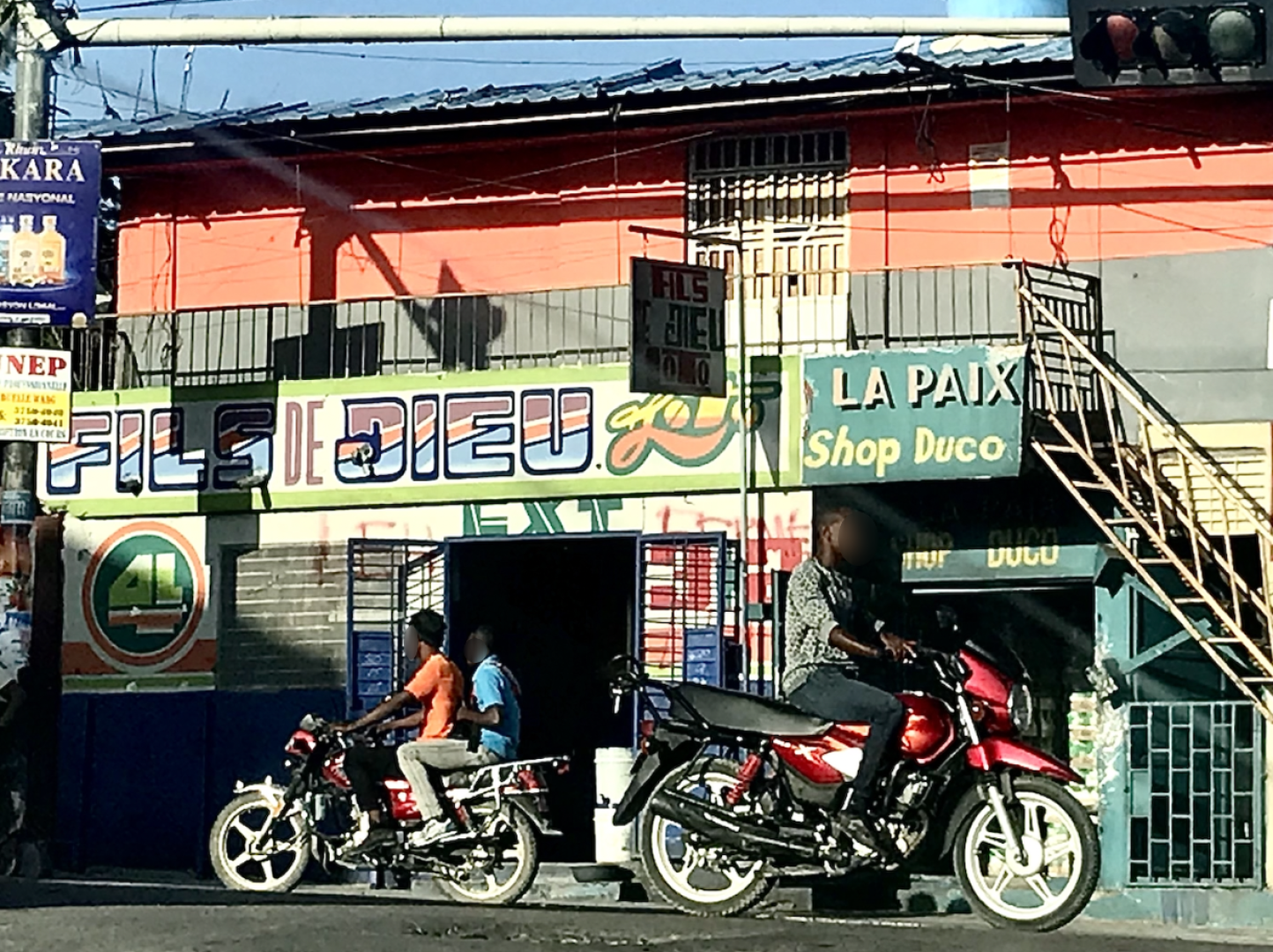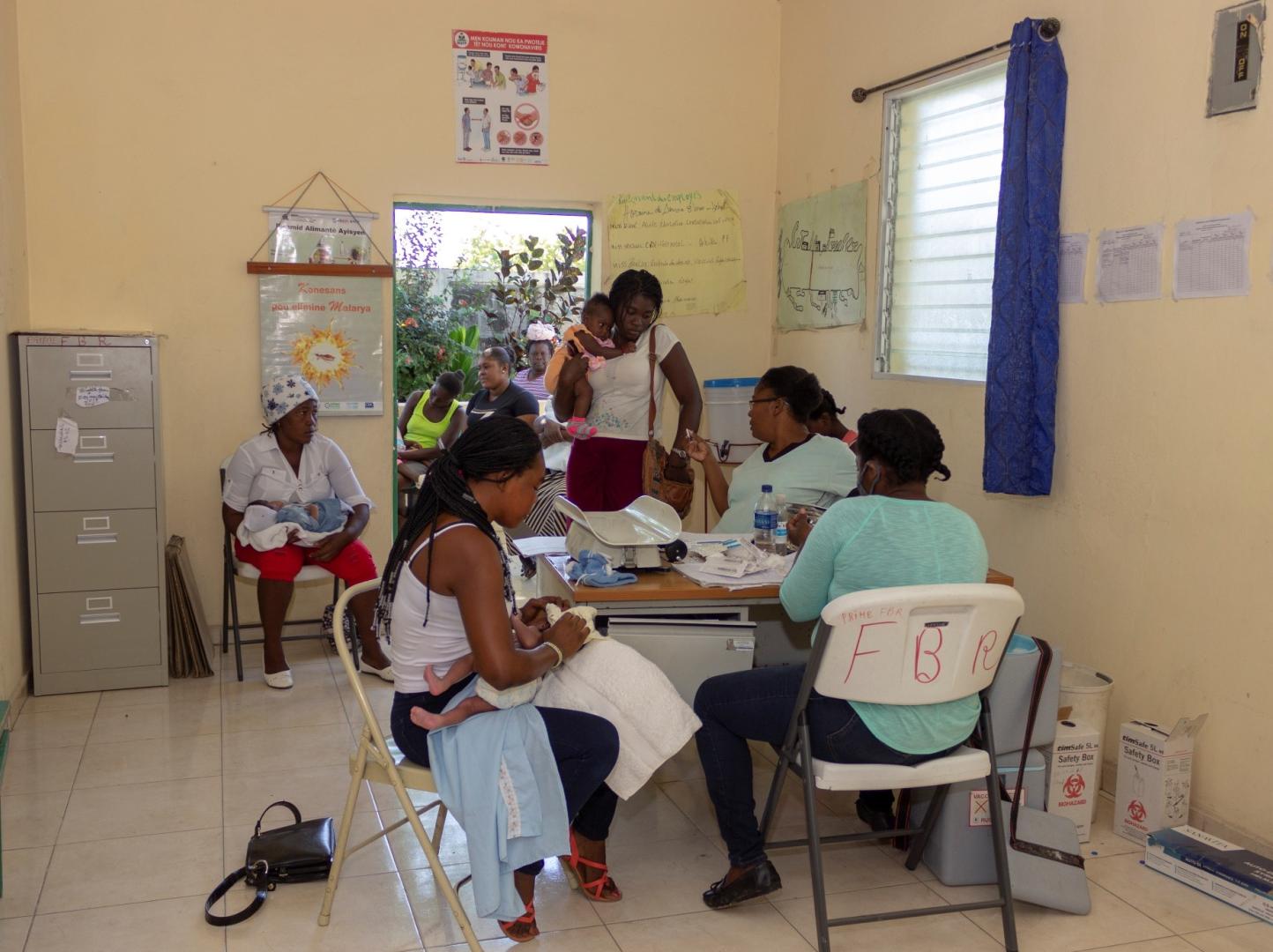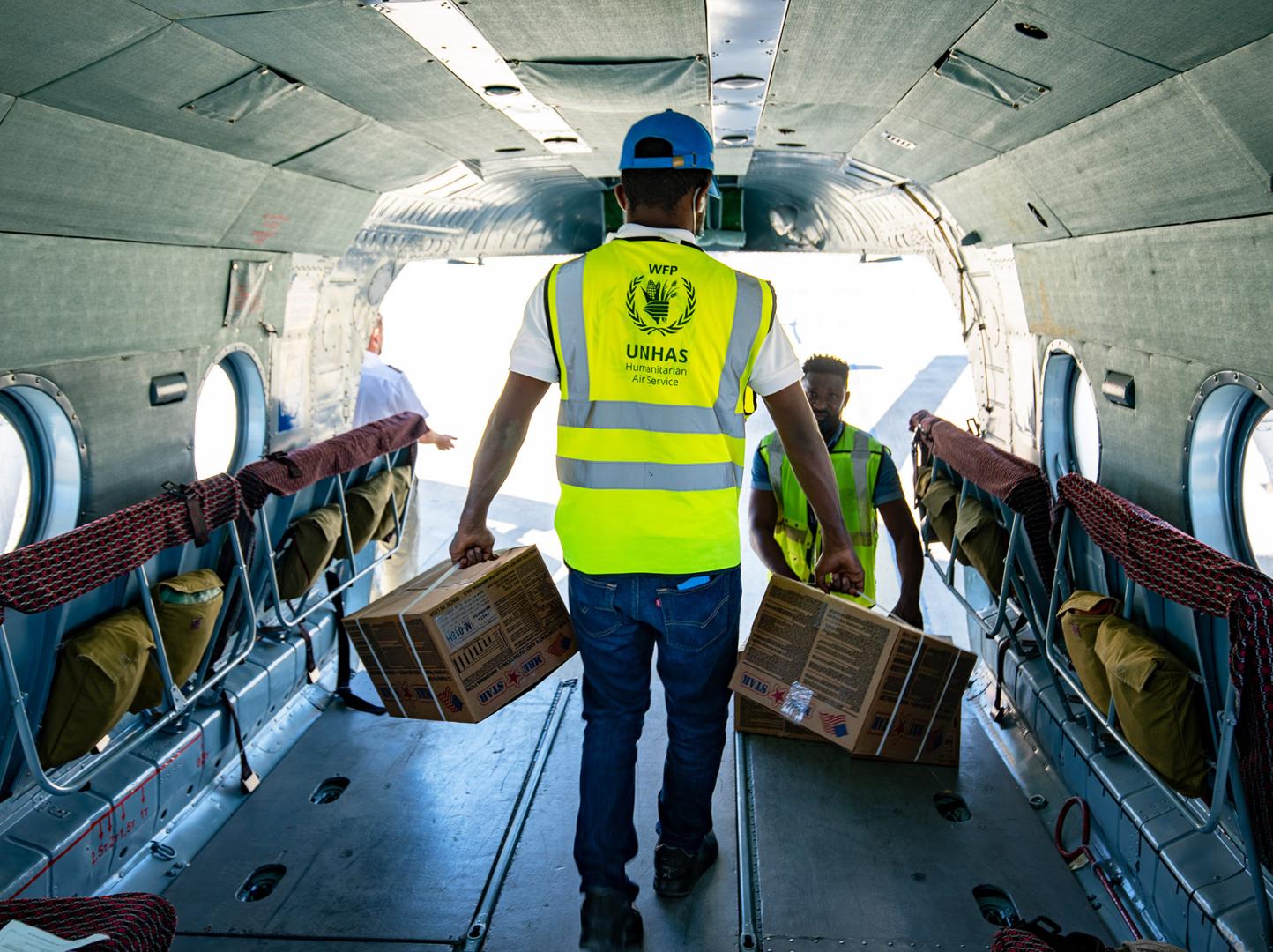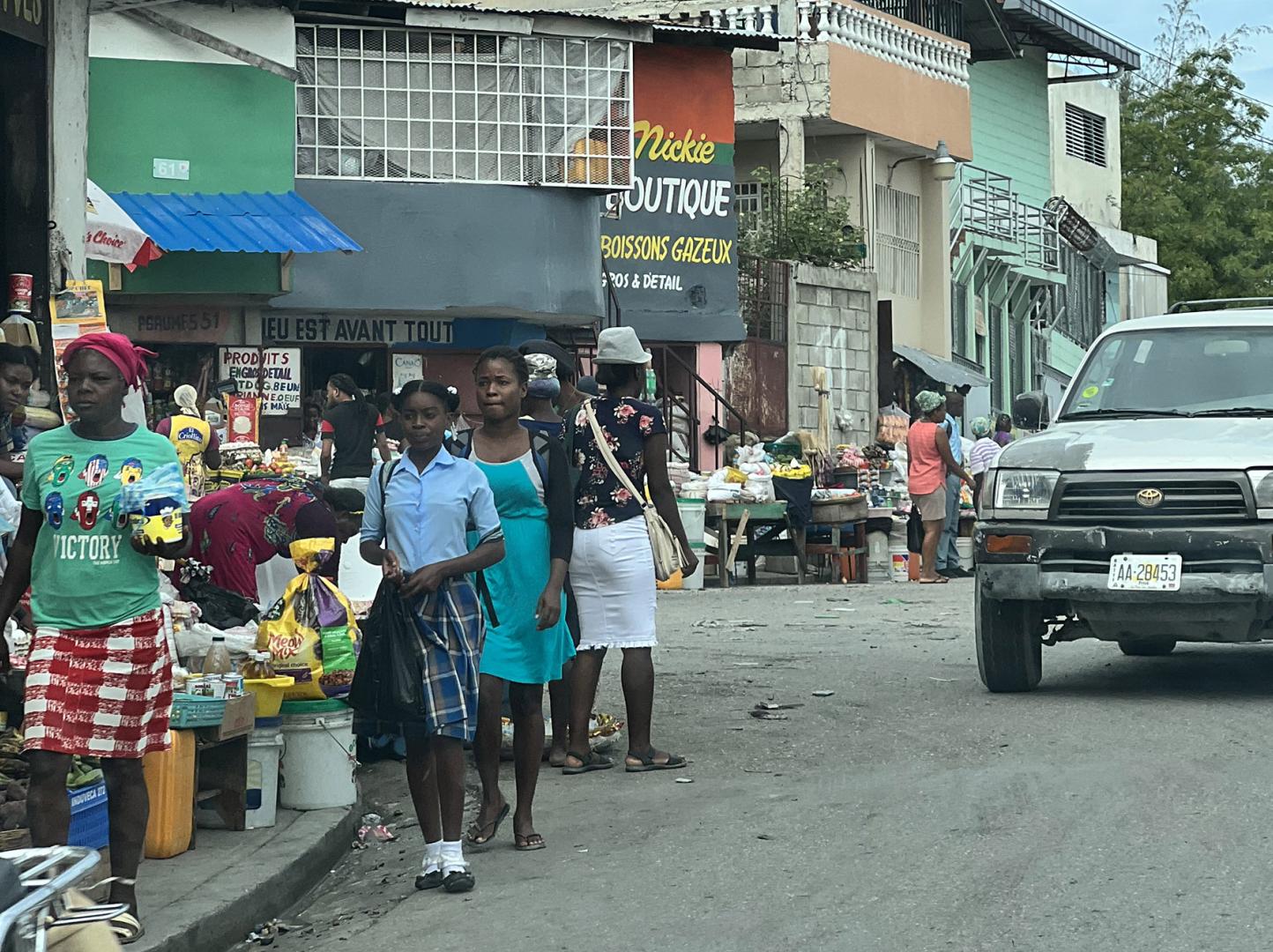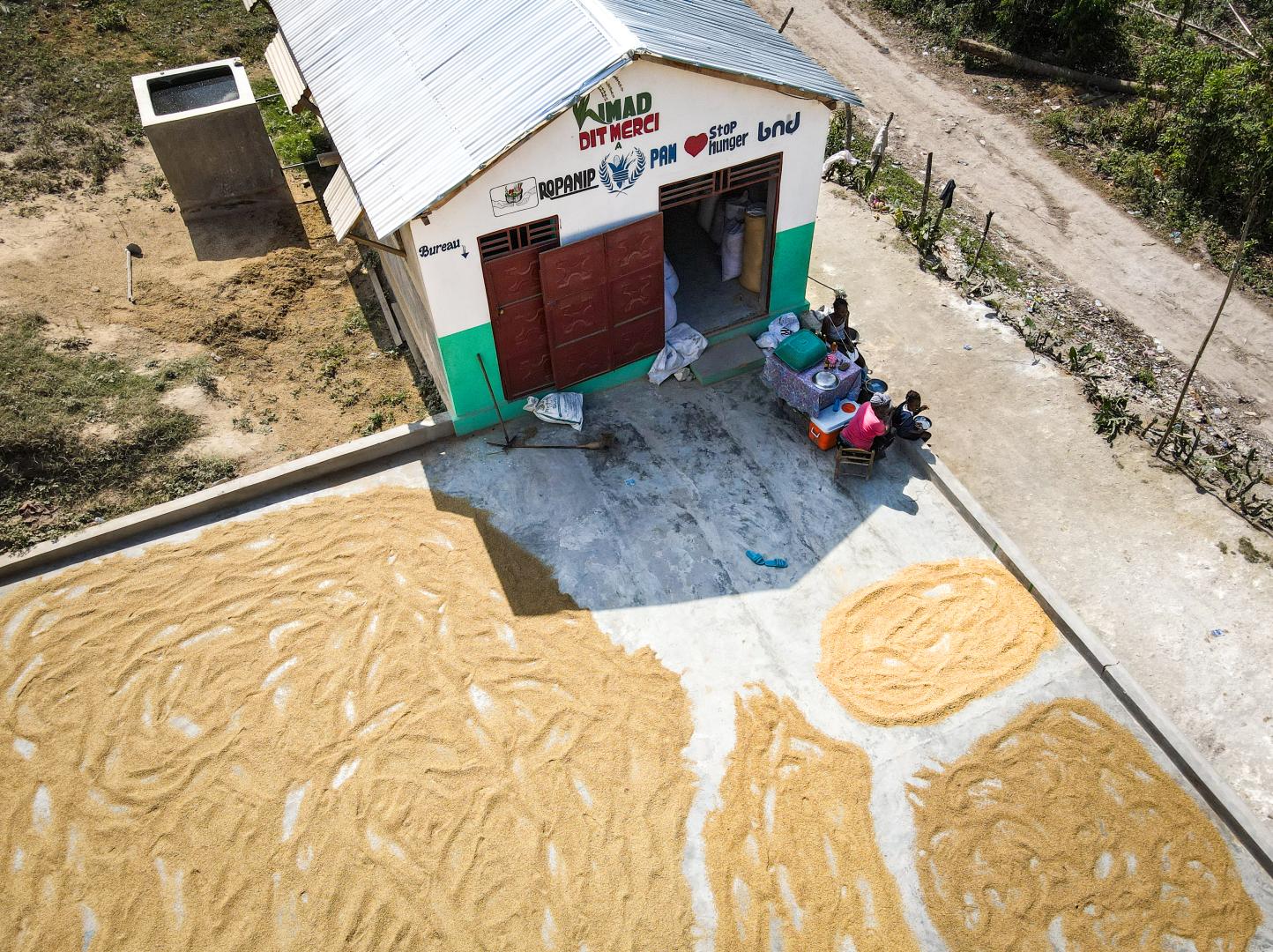Latest
Press Release
29 October 2025
Project : Strengthen Agricultural Opportunities through Training and Technological Investment (P.R.O.F.I.T.) / Participation of a Haitian Delegation in the World Chocolate Fair
Learn more
Story
17 October 2025
Haiti is under a UN arms embargo: So why are 500,000 illegal weapons in circulation?
Learn more
Story
03 October 2025
Ms. Nicole Flora Boni Kouassi of Côte d'Ivoire - Deputy Special Representative of the Secretary-General for the United Nations Integrated Office in Haiti and Resident Coordinator in Haiti
Learn more
Latest
The Sustainable Development Goals in Haiti
The Sustainable Development Goals (SDGs), also known as the Global Goals, are a universal call to action aimed at eradicating poverty, protecting the planet and ensuring peace and prosperity for all people. These are also the objectives of the UN in Haiti.
Publication
04 September 2025
Common Country Analysis (CCA) - Haiti - 2025
Launched in May 2024, the process of updating the Common Country Analysis (CCA) was based on a collaborative approach, mobilizing all entities of the United Nations System to refine the 2022 analysis. This update takes into account emerging risks to identify levers for action in support of an integrated and adapted response. The document covers statistical data from October 2022 to March 2025, with variable depth. It also includes brief footnote references to major developments that occurred between March and June 2025, which will be considered in the next update.Preparatory discussions ahead of the analytical work confirmed not only the persistence but also the worsening of challenges identified in 2022, including impunity, governance failures, economic exclusion, and systemic links between political networks, economic interests, and violence. A notable development is the intensification of popular justice, commonly referred to as “bwa kale”, following the events of 2024. These dynamics have continued to undermine national cohesion and weaken the legitimacy of the State.Indicators related to poverty, food insecurity, forced mobility, destruction of public services, and institutional fragmentation have reached critical levels. Simultaneously, the escalation of armed violence, the disintegration of the security apparatus, growing regional tensions, and the multiplication of natural disasters—with differentiated impacts on vulnerable groups such as women, youth, children, and persons with disabilities—require a reassessment of strategic priorities for the United Nations.In this context, the update aims to provide a rigorous and multidimensional diagnosis, serving as an analytical foundation for identifying adjustments to the implementation of the United Nations Sustainable Development Cooperation Framework (UNSDCF) 2022–2027.Please download the PDF file to access the full content of the analysis (only in French).
1 of 5

Publication
22 May 2025
Rapport annuel des résultats 2024 de l’Équipe Pays des Nations Unies en Haïti
L’année 2024 restera gravée dans nos mémoires comme une période d’épreuves et de résilience. Haïti a traversé une crise sans précédent, marquée par une situation économique toujours plus précaire et une insécurité galopante, affectant chaque aspect de la vie quotidienne. La violence des gangs armés a plongé des milliers de familles dans le deuil, la peur et a causé des déplacements forcés, exacerbant les vulnérabilités et menaçant les droits fondamentaux des populations, en particulier des femmes et des enfants.Dans cet environnement complexe, l’Équipe pays des Nations Unies a su s’adapter, innover et redoubler d’efforts pour continuer à soutenir les populations les plus touchées. Avec un engagement renouvelé, elle a mis en place des stratégies conciliant réponse humanitaire et actions de développement. Ainsi, nous avons renforcé des chaînes de valeur agricoles pour assurer une meilleure sécurité alimentaire, soutenu des structures éducatives et sanitaires, et intensifié nos actions en faveur de la protection de l’environnement et des paysages résilients. Parallèlement, nous avons appuyé des activités de plaidoyer initiées par des organisations de la société civile haïtienne en faveur des droits humains. Nous avons aussi contribué au renforcement de la justice dans un contexte en proie aux violences et aux exactions. Face à la crise humanitaire et sécuritaire, nous avons réaffirmé notre soutien aux autorités de transition dans leurs efforts de stabilisation et de renforcement des institutions démocratiques. Nos initiatives sont alignées sur les objectifs du «Pacte pour l’avenir» qui visent à favoriser une gouvernance inclusive et à poser les bases d’une paix durable. Dans ce cadre, le plaidoyer et l’accompagnement pour la tenue d’élections libres et transparentes ont constitué un axe d’intervention fondamental.Le renforcement de notre présence sur l’ensemble du territoire haïtien, et la collaboration accrue avec des organisations locales haïtiennes nous ont permis d’être plus efficace et de nous adapter face aux réalités complexes du terrain. Je vous invite, donc, à prendre connaissance des résultats présentés dans ce rapport de 2024, témoignant de la résilience et du courage du personnel des Nations Unies en Haïti, ainsi que de l’engagement de nos différents partenaires techniques et financiers qui continuent d’investir leurs efforts, pour donner de l’espoir aux Haïtiennes et Haïtiens, et parvenir à un pays économiquement fort, socialement juste, et politiquement stable et démocratique. Ulrika RichardsonCoordonnatrice résidenteCoordonnatrice humanitaire
1 of 5

Publication
20 April 2023
Cadre de Coopération des Nations Unies pour le Développement Durable 2023-2027
Le Cadre de Coopération des Nations Unies pour le Développement Durable représente l’engagement collectif de l’ONU en Haïti afin d’accompagner les efforts du pays dans la réalisation de l’Agenda 2030 pour le développement durable et assurer une mise en œuvre du Programme Commun des Nations Unies ainsi que le Nouvel Agenda pour la Paix.
Le Cadre de Coopération des Nations Unies pour le Développement Durable est aligné sur les priorités du Plan Stratégique de Développement d’Haïti (PSDH) et sur la vision du Gouvernement visant à faire d’Haïti un pays émergent. Élaboré sur la base des principes de la réforme du Système des Nations Unies, ce Cadre de Coopération marque un nouvel élan dans le partenariat entre l’ONU et le Gouvernement pour la période 2023-2027. Il repose sur une vision partagée des défis et des opportunités du pays. Il s’aligne aussi sur les recommandations issues de l’Examen périodique universel (EPU) d’Haïti de 2022 et fait écho aux valeurs de justice, de liberté et de dignité portées par la Déclaration universelle des droits de l’homme.
1 of 5
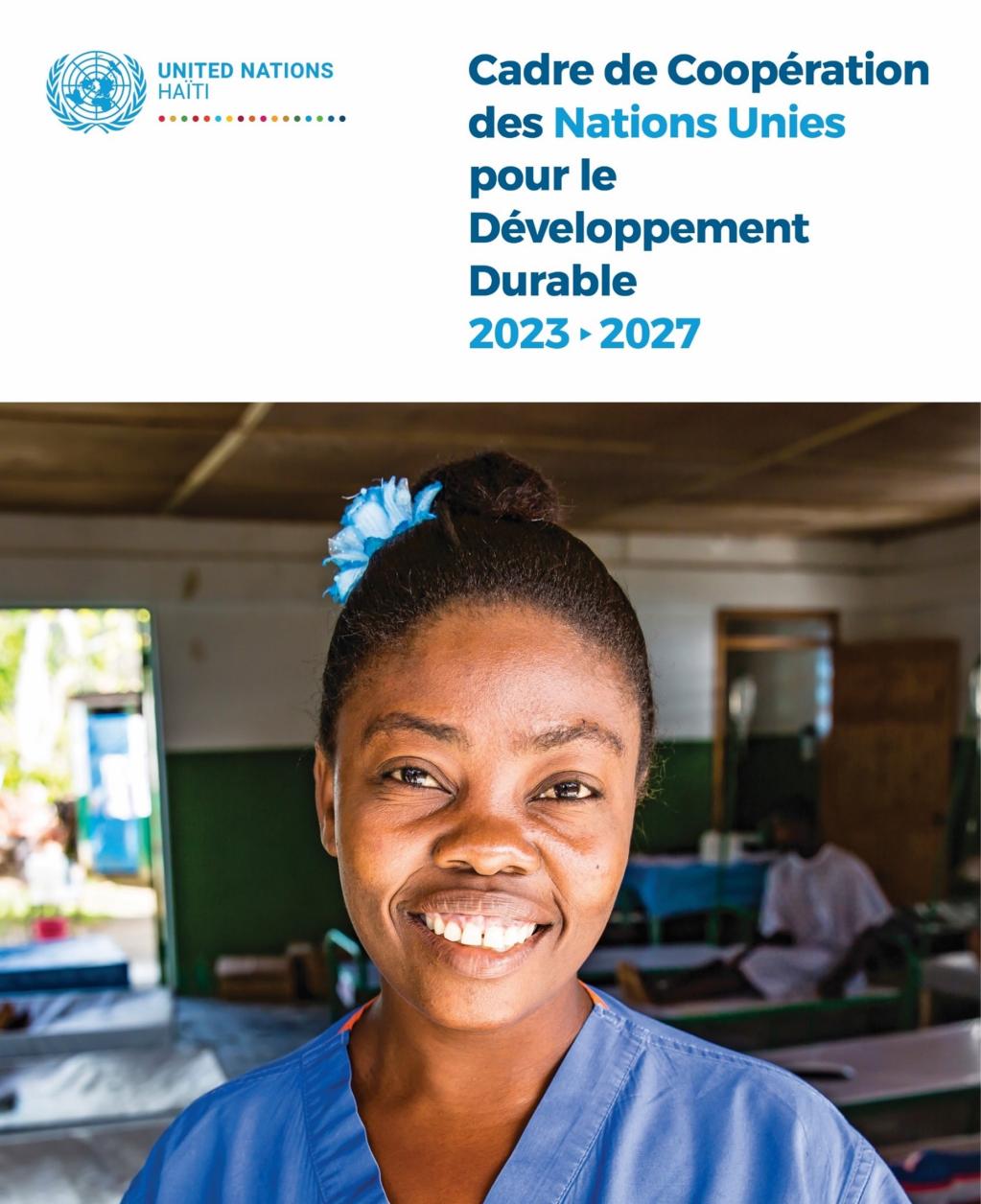
Press Release
22 April 2025
Reaffirming the United Nations’ support for Haiti: Resilience and a Call for Commitment
This event highlighted the vital work of humanitarian and development actors amidst dire security challenges and a worsening humanitarian crisis. Efforts focus on vulnerable groups, especially in Port-au-Prince and the Artibonite region, where relentless gang violence has displaced hundreds of thousands, disproportionately impacting women and children. Across Haiti, over one million people are now displaced, a threefold increase in just a year. Nearly half the population, 5.7 million people, faces acute food insecurity, including over 8,000 in displacement sites enduring catastrophic hunger. Held alongside the World Bank's Spring Meetings, the event reaffirmed the United Nations' commitment to staying engaged on the ground. "UN humanitarian and development teams, in collaboration with international and national partners, are responding to Haiti's emergency by providing medical and mental health care, food, clean water, education, social protection, and jobs. But beyond immediate aid, we are addressing the root causes of instability, because what Haitians want and deserve is not just assistance, but dignity, stability, and peace", said Ulrika Richardson, Resident and Humanitarian Coordinator of the UN system in Haiti.Since the deterioration of the crisis, the UN has expanded its presence outside the capital Port-au-Prince, working closely with national partners to drive impactful change. Collective efforts focus on strengthening local agriculture and agrobusiness and value chains, job creation, rehabilitating critical infrastructure in education and healthcare. Additionally, environmental protection and resilient landscapes remain parallel priorities.The United Nations remains steadfast in its commitment to support Haiti in its path towards stability, sustainable development, and peace. The UN calls on international partners to reinforce their constructive engagement with Haiti and the Haitian people. Jefferson BelizaireAssociate Development Coordination Officer, Programme Communications and AdvocacyJefferson.belizaire@un.org
1 of 5
Press Release
19 May 2025
Haiti Humanitarian Country Team deeply concerned about the deportation of pregnant and breastfeeding women from the Dominican Republic
According to the latest data from the International Organization for Migration (IOM), nearly 20,000 individuals — including a growing number of highly vulnerable women — were deported by land in April 2025, marking a record number for a one-month period. At the Belladère and Ouanaminthe border crossings, the National Office for Migration (ONM) and IOM, in coordination with other partners, have assisted an average of 15 pregnant women and 15 breastfeeding mothers per day since 22 April.“It is imperative that commitments to protecting vulnerable populations are upheld. These expulsions raise serious humanitarian and human rights concerns, particularly when they involve pregnant women or mothers with very young children,” said Ulrika Richardson, United Nations Humanitarian Coordinator in Haiti.These deportations compound an already complex humanitarian crisis affecting millions of people across the country. Armed violence in several regions has displaced more than one million individuals.In addition, food insecurity continues to worsen nationwide. Over 5.7 million people — half the population — are currently facing acute food insecurity, with pockets of near-famine conditions.In response to this situation, United Nations agencies and their humanitarian partners, in coordination with Haitian authorities, are mobilizing to address the most urgent needs — including through the provision of safe drinking water, adapted hygiene kits, medical care, temporary shelter, psychosocial support, and food assistance.The Humanitarian Country Team in Haiti calls for migration policies that uphold human dignity and urges enhanced regional solidarity to address a crisis that transcends borders and endangers the rights and lives of thousands. For more information, please contact:
Claire-Emmanuelle Pressoir, Public Information Officer, OCHA Haiti, Port-au-Prince
claire.pressoir@un.org This article first appeared in Haiti | ReliefWeb
Claire-Emmanuelle Pressoir, Public Information Officer, OCHA Haiti, Port-au-Prince
claire.pressoir@un.org This article first appeared in Haiti | ReliefWeb
1 of 5
Story
17 October 2025
Haiti is under a UN arms embargo: So why are 500,000 illegal weapons in circulation?
Up to 500,000 illegal weapons ranging from handguns to battlefield-grade semi-automatic rifles are thought to be in the hands of gangs in Haiti, even though the Caribbean country has been under a UN arms embargo for the last three years. Haiti is facing an acute security crisis as rival gangs fight for control of the capital, Port-au-Prince, and surrounding areas while terrorizing local communities through extortion, sexual violence, kidnap for ransom and murder.UN Member States agreed to impose an arms embargo on Haiti in 2022 – so what has gone wrong? Here are five things you need to know.How many weapons are in Haiti?Haiti does not manufacture firearms or ammunition, but according to the latest figures released by the UN human rights office there are an estimated between 270,000 and 500,000 illegal weapons in circulation.They are not just in the hands of the many murderous gangs that control most of the capital, they’re also common among the growing number of vigilante “justice” groups which are trying to protect people and property in troubled neighbourhoods of Port-au-Prince.The impact of so many weapons in a metropolitan area of around 2.6 million people is devastating. In 2024 alone, over 5,600 people were killed due to gang-related activity according to the UN. During just five days in early December 2024, at least 207 were killed by gangs controlling the Wharf Jérémie area of the capital. Human rights violations and abuses documented by the UN have included mass killings, kidnappings for ransom, rape and sexual exploitation, destruction of property, and severe restrictions on access to essential services, particularly healthcare and education.What firearms are in circulation?It is difficult to accurately estimate the number of illegal firearms in the hands of gangs and vigilante groups, but there are indications that more sophisticated and deadly weapons are being used. The Haitian authorities are having limited success in stopping the flow of weapons. One shipment of arms procured in Miami in the United States and intercepted in the Dominican Republic in February 2025 included a heavy Barret M82 semi-automatic rifle, sniper rifles, an Uzi submachine gun and more than 36,000 rounds of ammunition. What does the embargo say? The arms embargo as well as travel bans and asset freezes on individuals was authorized by the UN Security Council in October 2022.Specifically targeting gangs and individuals deemed responsible for threatening Haiti’s peace and security, it calls on UN Member States to prohibit the supply, sale, or transfer of arms and related material of all types, including technical assistance, training, and financial support related to military activities. It recognizes that the situation in Haiti poses a threat to regional peace.How is the embargo being circumvented?Well-established trafficking routes from the US, primarily from Miami – but also from New York via the Dominican Republic – continue to be exploited, often due to weak customs enforcement and corruption.Some shipments are being intercepted by US authorities before they reach Haiti. There is also evidence of weapons being shipped from Venezuela and other South American countries.Weapons are frequently concealed within mixed cargo or declared as humanitarian or commercial goods to evade inspection.There are also growing concerns that assault rifles originally registered to private security companies operating in Haiti are ending up in the hands of gang members.What needs to be done to ensure the embargo is adhered to and how is the UN helping?The UN Office on Drugs and Crime (UNODC) which works on trafficking issues has said that ensuring adherence requires a “comprehensive and coordinated approach at the national, regional and international levels.” That means equipping Haitian customs, port and border control authorities with the technical capacity to detect, interdict and investigate illicit arms shipments. Currently, there is not even one large-format scanner in all of Haiti which could efficiently identify the contents of a shipping container or truck. Given that most weapons enter Haiti through maritime routes, improving maritime and port security – including inspections – is essential as well as working more effectively with law enforcement authorities in the countries of origin.Providing more resources along the porous border with the Dominican Republic, which shares the island of Hispaniola with Haiti, would help to stop illicit trafficking through unofficial crossings.The UN is helping to coordinate Haiti and other countries in the region to ensure compliance as well as providing technical assistance to strengthen arms tracing, customs controls and financial investigations.“Combating corruption and illicit financial flows also remains central to embargo compliance,” said UNODC.Given that Haiti manufactures neither guns nor ammunition, cutting off the supply of bullets alone would effectively end the ability of gangs to fight each other and terrorise communities.
Published on UN News
Published on UN News
1 of 5

Story
03 October 2025
Ms. Nicole Flora Boni Kouassi of Côte d'Ivoire - Deputy Special Representative of the Secretary-General for the United Nations Integrated Office in Haiti and Resident Coordinator in Haiti
United Nations Secretary-General António Guterres announced today the appointment of Nicole Flora Boni Kouassi of Côte d'Ivoire as his new Deputy Special Representative for the United Nations Integrated Office in Haiti (BINUH) and Resident Coordinator in Haiti. Ms. Boni Kouassi will also serve as Humanitarian Coordinator.Ms. Boni Kouassi succeeds Ingeborg Ulrika Ulfsdotter Richardson of Sweden, to whom the Secretary-General is grateful for her dedicated service and steadfast commitment to the United Nations (UN).
Ms. Boni Kouassi brings over 22 years of UN experience to this position, with extensive experience in development, peace and security, and humanitarian work. She has been serving as United Nations Development Programme (UNDP) Resident Representative in Niger since 2022, where she also assumed the role of Resident and Humanitarian Coordinator ad interim between 2023-2024. Prior to that, she held the position of UNDP Resident Representative in Burundi between 2019-2022 and served as Resident and Humanitarian Coordinator ad interim in 2021.
Previously, she served in various leadership roles, notably as UNDP Deputy Resident Representative in Djibouti and Niger, and as Senior UN Coherence Specialist in New York.
Ms. Boni Kouassi holds a Doctorate in Medicine from the Université Félix Houphouët-Boigny, formerly known as Université de Cocody in Abidjan, Côte d'Ivoire and a Master of Public Health from the Johns Hopkins Bloomberg School of Public Health in Maryland, USA. In addition to her native Baule, she is fluent in English and French. This article first appeared in www.un.org
Ms. Boni Kouassi brings over 22 years of UN experience to this position, with extensive experience in development, peace and security, and humanitarian work. She has been serving as United Nations Development Programme (UNDP) Resident Representative in Niger since 2022, where she also assumed the role of Resident and Humanitarian Coordinator ad interim between 2023-2024. Prior to that, she held the position of UNDP Resident Representative in Burundi between 2019-2022 and served as Resident and Humanitarian Coordinator ad interim in 2021.
Previously, she served in various leadership roles, notably as UNDP Deputy Resident Representative in Djibouti and Niger, and as Senior UN Coherence Specialist in New York.
Ms. Boni Kouassi holds a Doctorate in Medicine from the Université Félix Houphouët-Boigny, formerly known as Université de Cocody in Abidjan, Côte d'Ivoire and a Master of Public Health from the Johns Hopkins Bloomberg School of Public Health in Maryland, USA. In addition to her native Baule, she is fluent in English and French. This article first appeared in www.un.org
1 of 5

Story
11 February 2025
Flash Appeal for the United Nations Humanitarian Air Service (UNHAS) in Haiti
WFP urgently REQUIRES uS$3.9 million to maintain UNHAS operations - the only aviation support available to the humanitarian community in Haiti, for the next 3 months. This critical funding is needed to avert an im-minent risk of UNHAS closure, jeopardizing the timely delivery of aid and personnel as humanitarian needs escalate in the country.Country contextHaiti is experiencing a protracted political, security and socio-economic crisis, placing it among the most acute hunger crises in the world. With over half of the country grappling with hunger, the Global Humanitarian Overview estimates that in 2025, 6 million will need humanitarian assistance, of which 4 million will be prioritized. Surging insecurity in Haiti in 2024 led to unprecedented humanitarian needs, while also necessitating flexibility and innovation from UNHAS to continue providing essential air transport services for the humanitarian community. Increased violence associated with armed groups, mostly in the capital, led to an upsurge of people being forced to flee their homes, bringing the total number displaced people to more than 1 million by the end of 2024, more than a threefold increase in a year. According to the Integrated Food Security Phase Classification (IPC) for Haiti published in September 2024, 5.4 million people in Haiti were facing acute food insecurity, of which 2 million are categorized as experiencing emergency levels of hunger. The suspension of all commercial flights serving the Port-au-Prince airport until further notice, has only intensified these issues, isolating affected populations and severely restricting access to essential services. As humanitarian needs escalate, the situation on the ground underscores the urgent requirement for immediate and robust interventions to support those most vulnerable.Why is UNHAS critical in Haiti?The current funding outlook places UNHAS at risk of imminent shutdown in Haiti, where the escalation of violence has effectively suspended all commercial air services to the Port-au-Prince airport, severely limiting the movement of humanitarian aid and personnel in a time of critical need. The United Nations Humanitarian Air Service (UNHAS) - as the only available aviation support serving Port-au-Prince - is therefore uniquely positioned to bridge this gap by providing uninterrupted access for aid organizations.UNHAS ensures rapid deployment of staff and transport of light cargo, and offers vital capacity for medical evacuations that are essential in an environment where traditional commercial options are unavailable.UNHAS operational planTo ensure continuous humanitarian access and effective emergency response in Haiti, UNHAS will maintain its current operational fleet, which comprises one fixed-wing aircraft and one helicopter. These two assets are critical to sustaining operations in an environment where commercial aviation options are unavailable. Given the closure of the Port-au-Prince commercial airport, the helicopter’s ability to operate from alternative locations, such as the United Nations office-adjacent field in Juvenat, is indispensable.UNHAS Haiti Route Map UNHAS will continue a fully operational mission to enable humanitarian efforts and access in a safe and efficient manner. A Chief Air Transport Officer will lead the mission, supported by essential operational personnel. Ancillary services will be activated to ensure seamless operations. UNHAS is planning to operate daily flights to Petion-Ville and nine additional destinations throughout Haiti. These regular airbridges will ensure vital humanitarian access to communities in need, facilitating the rapid deployment of aid workers, the transport of critical life saving supplies, and the execution of emergency medical evacuations.The flight schedule will be continuously reviewed and adjusted in response to evolving operational needs, ensuring that the service remains responsive and effective during this critical period.About UNHASUNHAS, managed by the World Food Programme, provides passenger and light cargo air transport services, enabling the humanitarian and development community to implement timely and effective responses in emergencies and protracted crises.Currently active with 21 operations globally, UNHAS plays a crucial role in ensuring timely and safe access to populations affected by hunger, conflict, insecurity, climate-related shocks, and health emergencies.Governance & business modelsUNHAS Haiti will continue to adopt a standard UNHAS governance structure. This includes a Steering Committee and a User Group Committee, both meeting regularly according to the WFP Aviation Policy in place. This structure ensures oversight and responsiveness to user needs.Flights in Haiti continue to operate under a partial cost recovery model to ensure ongoing humanitarian access, while limiting costs. Should funding challenges persist, the Steering Committee will revisit this framework and may consider adjustments to increase cost recovery, thereby enhancing long-term sustainability and offsetting a larger share of operational costs.Estimated CostsThe estimated cost to continue operating UNHAS Haiti with 1 fixed wing and 1 Helicopter for 3 months is US$3.9 million. This covers the aircraft, essential staffing, ground handling, and aviation fuel, ensuring a reliable flight schedule.Exit strategyUNHAS flights will be reduced or discontinued when reliable commercial aviation services are available to serve the humanitarian and development community and/or overland access improves.If humanitarian needs decrease, WFP will scale down operations accordingly, reallocating resources, as needed. This ensures a responsible and flexible approach to service termination. ContactsWFP Haiti Country OfficeArmando PUOTI
WFP Chief Air Transport Officer
armando.puoti@wfp.orgRaphael Guevin-Nicoloff | Head of Partnerships & Reporting
raphael.guevinnicoloff@wfp.org
WFP Headquarters ItalyFranklyn FRIMPONG | Chief WFP Aviation Service
franklyn.frimpong@wfp.orgHedley Tembeng TAH | Head of Information Management and External Relations Unit
hedley.tembeng@wfp.org World Food ProgrammeVia Cesare Giulio Viola 68/70,
00148 Rome, Italy - T +39 06 65131
wfp.org
WFP Chief Air Transport Officer
armando.puoti@wfp.orgRaphael Guevin-Nicoloff | Head of Partnerships & Reporting
raphael.guevinnicoloff@wfp.org
WFP Headquarters ItalyFranklyn FRIMPONG | Chief WFP Aviation Service
franklyn.frimpong@wfp.orgHedley Tembeng TAH | Head of Information Management and External Relations Unit
hedley.tembeng@wfp.org World Food ProgrammeVia Cesare Giulio Viola 68/70,
00148 Rome, Italy - T +39 06 65131
wfp.org
1 of 5

Story
22 August 2024
Haiti: Millions of lives on the brink amid multiple crises
Years of underfunding of humanitarian aid and increasing needs have put millions of Haitians at risk of chronic vulnerability, according to a newly released UN report.Reversing the situation will require the international community and donors to increase the funding of UN and non-governmental organization (NGO) relief operations, the UN humanitarian office, OCHA, said in its latest advocacy note.Growing hunger and needsMonths of violence have led to a deterioration of Haiti’s humanitarian crisis. Displacement has tripled in the last year in Haiti as gang violence continues to rock the Caribbean-island nation, with nearly 600,000 people on the run.“The indiscriminate violence of armed groups and the near collapse of basic services have plunged Haiti into a humanitarian crisis unprecedented since 2010,” OCHA reported, referring to the devasting earthquake that struck the nation 14 years ago.Following the spiralling security situation in the capital, Port-au-Prince, and Artibonite in the north in February, the number of displaced persons has soared by 60 per cent, the report showed, using the latest figures from the International Organization for Migration (IOM) data tracking matrix for Haiti.Collapsing basic servicesThe violence continues to target civilian infrastructure, with only 24 per cent of hospitals remaining operational, OCHA reported. The insecurity has also left 1.5 million children shut out of classrooms.Half of the 578,000 displaced people, desperately fleeing the capital in search of safety, had made their way south, where the vast majority are staying with already economically vulnerable host families.However, basic social services, such as education, health and water, hygiene and sanitation, already insufficient to meet the needs of the local population, have been severely strained, OCHA reported.Forced deportationsMeanwhile, forced repatriations of Haitians from countries in the region is continuing.Indeed, deportations of Haitian nationals even increased, particularly from April onwards, when incidents of violence were at their peak, OCHA reported.In the first seven months of the year, nearly 100,000 people were deported from countries in the region to Haiti, according to data from IOM.‘Wave of violence’The violent clashes between gangs and the authorities have also persisted, even as the multinational security support mission arrived in late June to help Haitian police address the ongoing crisis.“This wave of violence continues to have humanitarian consequences on the populations of the affected neighbourhoods and localities, but also in areas far from the capital which have become host lands for hundreds of thousands of people,” OCHA stated in the report.Almost 300,000 malnutrition cases have been documented, and five million people, about 50 per cent of Haiti’s population, face heightened food insecurity, according to a report earlier this year by a global monitoring group, the Integrated Food Security Phase Classification (IPC).Fears the crisis will spreadThere are fears that the epicentre of the current humanitarian crisis will gradually shift to an increasing number of areas previously spared by insecurity, according to OCHA.At the same time, the current hurricane season is expected to be active and could cause an additional shockwave on the daily lives of Haitians.Haiti is bracing for between four and seven major storms in the months to come. Calls to fill funding gapsAdditional financial resources are urgently needed to meet the increased needs of the Haitian population affected by this multidimensional crisis, OCHA said in its report.Without additional funds, OCHA fears that these crises will continue.Humanitarian concerns abound that food insecurity will continue to spread, hundreds of thousands of out-of-school children will face the risk of recruitment by armed groups and experience “lost years”, growing up without the skills needed for their future and survival, and that half a million vulnerable children and victims of protection incidents will be deprived of mental health services and psychosocial support, according to OCHA.“While humanitarian assistance is a lifeline for many, it is only part of the solution,” the UN agency said.“The government, political and development actors must work together to find lasting solutions to Haiti’s structural challenges,” OCHA said, echoing a call made last month by a joint UN-European Union mission to the country.Eight months into the year, Haiti’s 2024 Humanitarian Response Plan is 33 per cent funded, having received $162.5 million out of $674 million. This article first appeared in UN News.
1 of 5
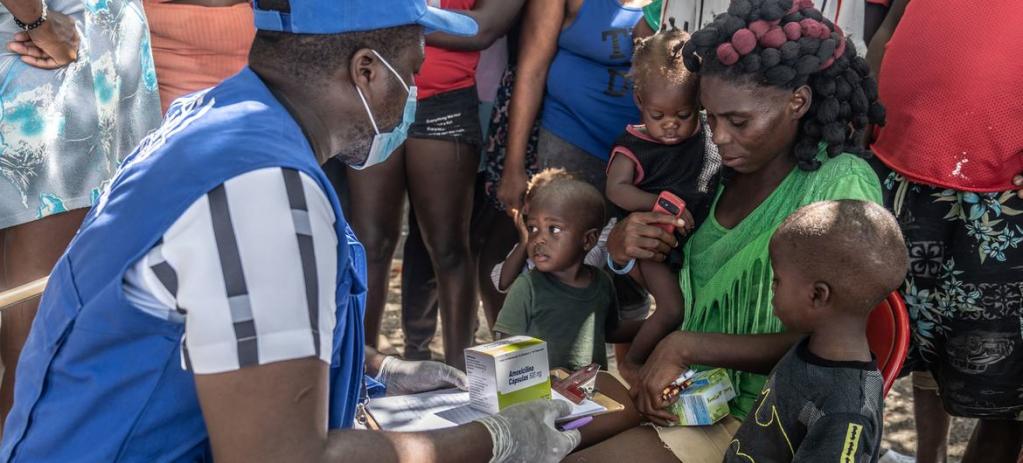
Story
26 July 2024
Global education fund announces $2.5 million grant for Haiti
A UN-backed global fund that supports education in emergencies will provide $2.5 million to ensure that thousands of children affected by gang violence in Haiti can attend school in safety. Yasmine Sherif, Executive Director of Education Cannot Wait (ECW), announced the grant on Friday in the capital, Port-au-Prince, during a high-level UN mission to the Caribbean country.The aim is to reach nearly 75,000 children and adolescents in the hard-hit departments of Ouest, home to the capital city, and Artibonite.The power of educationMs. Sherif urged world leaders not to turn their backs on the boys and girls of Haiti.“With the power of education, we can protect these girls and boys from the grave risks of sexual violence, forced recruitment in armed groups and other human rights violations,” she said.“With the power of education, we can lift up an entire nation from a never-ending cycle of hunger, poverty, economic uncertainty and violence.”The UN Children’s Fund (UNICEF) will deliver the grant in collaboration with the UN World Food Programme (WFP), and other local and international partners.The funding will support back-to-school incentives, school feeding programmes, early childhood education, disability inclusion, mental health and psychosocial support, cash transfers to families in need, and other support, to enable children’s access to safe learning environments.Dire humanitarian needsHaiti is experiencing unprecedented levels of lawlessness and brutality at the hands of coalitions of armed groups. The situation is compounded by climate change, recurring cyclones and earthquakes, including a devastating one in 2021 that claimed over 2,300 lives and caused severe damage. Nearly half the population, some 5.5 million people, are dependent on humanitarian aid, while five million are facing acute hunger. Nearly 580,000 Haitians are displaced, a 60 per cent increase since the end of February.The armed groups are targeting schools and hospitals, with concerning reports of ruthless forms of sexual violence, including gang rape. They are also accused of forced recruitment of children, with estimates that 30 per cent to 50 per cent of their members could be children.Education crisis unfoldingFurthermore, estimates indicate that 1.2 million school-aged children urgently need quality education.Schools are being closed or used as displacement centres across the country. Around 919 schools are closed in Ouest and Artibonite departments alone, representing 10 per cent of all schools in these areas.“The education crisis unfolding in Haiti is seriously close to becoming an education tragedy,” said Bruno Maes, UNICEF Representative in the country.“While enrolment rates were already low before the latest escalation of violence, school closures and mass displacement are robbing thousands more children of their opportunity to learn.”Expanding investment globallyThe grant brings total ECW funding in Haiti to more than $15.8 million.Despite the urgent needs, ECW said the $30 million requirement for education response in Haiti – part of an overall humanitarian plan for the country - is less than 30 per cent funded, according to the UN humanitarian affairs office, OCHA.ECW supports quality education for refugee, internally displaced and other crisis-affected children. The fund and partners are calling on world leaders to urgently mobilize an additional $600 million toward its three-year strategic plan.These new resources will allow the fund to expand investments in Haiti and other crisis regions, to reach 20 million girls and boys. This article first appeared in UN News.
1 of 5
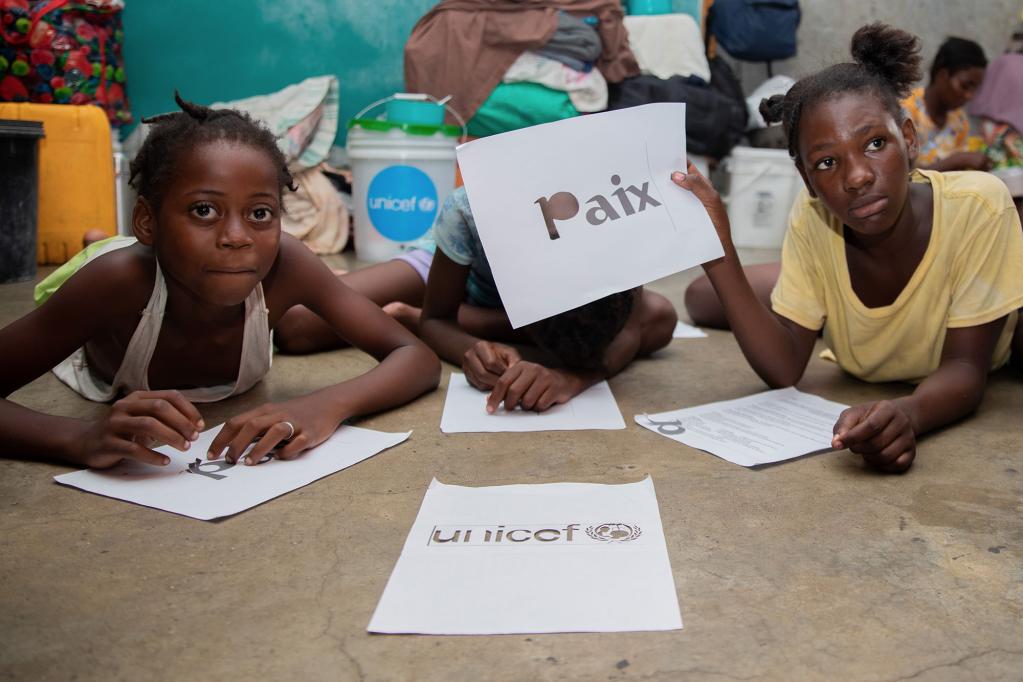
Press Release
29 October 2025
Project : Strengthen Agricultural Opportunities through Training and Technological Investment (P.R.O.F.I.T.) / Participation of a Haitian Delegation in the World Chocolate Fair
From October 29 to November 2, 2024, Haitian cocoa will be proudly represented at the 30th edition of the World Chocolate Fair, held in Paris at Porte de Versailles. With support from the International Labour Organization (ILO) through the PROFIT project funded by the Norwegian Ministry of Foreign Affairs, key cocoa stakeholders from southern Haiti—AYITIKA, KALEOS S.A., KAÛNA, RALPH LEROY, the Departmental Agricultural Directorate (DDAGA), and GEONOVA—will travel to showcase and sell cocoa products and derivatives, and to highlight the richness and opportunities tied to this crop. These partners are joining forces and speaking with one voice to promote Haiti’s delicious cocoa, known for its unique flavors—from the raw cocoa bean to aromatic chocolate bars and exceptional cocoa butter. They will also share a message of resilience and hope from the producers who bravely invest in the sector despite the immense challenges facing Haitian agriculture. At the World Chocolate Fair, participants will demonstrate their expertise in cocoa cultivation and its transformation into derivative products. They will also present innovative elements introduced to revitalize the sector. Such efforts have enabled Haiti to earn fair trade certification multiple times, offering better guarantees of decent income for producers.KALEOS, KAÛNA, and LEROY Chocolat will present, exhibit, and offer tastings of cocoa products—including chocolate bars, cocoa powder and butter, hot chocolate, and, in a world premiere, the gluten-free CHOUCOUNE biscuit made from breadfruit flour and cocoa—originating from Haiti’s rich and distinctive terroir, which, once processed, yields the most exotic and refined flavors. GEONOVA will also showcase the integrated technology now used in managing and structuring the sector, including a logistics intelligence system that enables georeferencing of plots and producers. This ensures transparency in the value chain, reliability in traceability systems, and access to real-time data. These data help analyze and assess the state of the value chain to inform sound decision-making. Moreover, this logistics intelligence platform supports compliance with the new European EUDR standard for traceability and anti-deforestation commitments. Coordination efforts with DDAGA, capacity building for agricultural service providers, the involvement and empowerment of women, and the work of producer cooperatives will also be highlighted to demonstrate resilience in a country often affected by crises and natural disasters.For this 30th edition of the Fair, AYITIKA—already recognized with several international awards—will also share Haiti’s stand. With its “roots to bar” approach, AYITIKA aims to offer consumers chocolate bars that reflect the exquisite aromas of Haiti’s exceptional cocoa varieties and terroirs.Haiti’s participation in the World Chocolate Fair underscores the country’s potential and the many opportunities it holds, particularly in agriculture. It inspires hope that actors with diverse skills and experiences can unite across all sectors of society to help establish practices that bring lasting change to people’s lives. Prospectus for Haiti’s Participation in the Fair: Key Players in a Cocoa of Singular and Refined Flavors Contact :Fabrice LeclercqChief Technical Advisor – ILO HaitiTel : +509 3694 6825Email : leclercqf@ilo.org
1 of 5
Press Release
07 April 2025
At least 262 people killed over two months in brutal attacks in Kenscoff, on the heights of Port-au-Prince
"The information collected and verified by our teams following a thorough investigation establish that the attacks against Kenscoff were extremely brutal to create panic among the population", said the Special Representative of the Secretary General in Haiti and Head of BINUH, Maria Isabel Salvador.Men, women and children were executed inside their homes, while others were shot on the roads and paths while trying to escape. The bodies of the victims were then burned. Sexual violence, particularly rape, was also committed against women and young girls. Around 200 homes were destroyed or set on fire and more than 3,000 people had to flee.Criminal groups have carried out these attacks in order to extend their control over the mountainous localities of Kenscoff, in order to destabilize the municipality of Pétion-Ville. By extending their influence on this area, the criminal groups and those who support them would also seek to further weaken the authorities in place.On the first day of the attacks, January 27, Haitian security forces were deployed with delay. However, after that and despite limited means and personnel operating on several fronts across the capital, they have gradually strengthened their presence in the municipality of Kenscoff, with the support of the Multinational Security Support Mission.This deployment managed to slow down the progress of criminal groups but has not yet allowed to restore public order.The latest attacks were recorded in the municipality of Kenscoff between March 24 and 27, thus demonstrating the continued presence of criminal groups and their ability to install numerous cells in the area. Since the beginning of the confrontations, four members of the security forces have been killed and four others have been wounded. A member of the MSSM was also injured.Since the beginning of the attacks, State services, including the National Directorate of Potable Water and Sanitation (DINEPA), United Nations agencies and several national and international non-governmental organizations (NGOs) have provided humanitarian assistance and protective measures for those affected by this violence.However, these initiatives remain insufficient considering the needs and psychological trauma experienced by survivors, especially children, who have been victims or direct witnesses of extreme violence, including sexual violence.The report also contains recommendations to both the Haitian authorities and the international community to contribute to improving the security situation and supporting the security forces.The process of collecting data for this investigation followed a rigorous documentation and verification methodology, accurately identifying the sequence of events that occurred in Kenscoff, with attacks carried out in six stages, clearly detailed in the report published today.------Contact: Mathias Gillmann, Spokesperson, BINUH; E-mail: gillmann@un.org
1 of 5
Press Release
11 March 2025
Press statement by William O'Neill, UN expert on the human rights situation in Haiti
Hello everyone, thank you for being here.I am just back from Haiti where I was on a field mission to take stock of the human rights situation. This was my fourth visit since my appointment by the United Nations High Commissioner for Human Rights two years ago.This brief stay enabled me to assess the situation, not only how serious it is, but also and above all, above all, the pain and despair of an entire population. Suffering permeates all social strata, especially the most vulnerable. Despite the efforts of the Haitian National Police (PNH) and the Multinational Security Support (MSS) Mission, the risk of the capital falling under gang control is palpable.These violent criminal groups continue to extend and consolidate their hold beyond the capital. They kill, rape, terrorize, set fire to homes, orphanages, schools, hospitals, places of worship, recruit children and infiltrate all spheres of society. All this, with the utmost impunity and sometimes, as many sources point out, with the complicity of powerful actors.The testimonies we received speak for themselves and need no comment.*P., aged 16, survived the worst. “Seven masked gunmen broke into my home in Kenscoff, raped and beat me and my stepmother. Then they killed my father in front of me. The pain is excruciating. Sometimes I forget it, then it comes back. At night, I scream”. In the meantime, she says she “dances” and “dreams of being a psychologist for young survivors,” like herself. The young girl has been housed in a refuge for a few weeks. According to civil society, violence exacerbates all needs. There are not enough resources to take care of all the victims.“I just want to go back to the street,” concluded 12-year-old L., a child forcibly recruited by gangs. He is currently incarcerated at the Centre de Rééducation des Mineurs in Port-au-Prince and accused of association with the gangs. “I don't want any more bandits in my country. Later, I'll be a pilot,” he added.The violence has internally displaced over a million people (IDPs), and thousands more have been displaced just in recent weeks. They have nowhere to go. Students recently threw stones at IDPs attempting to occupy their school.. The desperate turning against the more desperate. In the makeshift camps, hunger and sexual violence are widespread. For many, it's a matter of survival.Unity and solidarity must guide political action at all levels, in the interests of the population.They must be the guiding principles for all Haitian actors, , in order to ensure security, the primacy of justice and the survival of the State. The fight against impunity and corruption are major obstacles to the dismantling of gangs. The Haitian State must therefore make the fight against these two scourges an absolute priority. The fight against gangs must be conducted in strict compliance with international human rights law, particularly the right to life. No circumstances, however exceptional, can justify the violation of this fundamental right.The international community, for its part, must act without delay to implement the commitments it has made, particularly with regard to the sanctions regime, the arms embargo, and the substantial reinforcement of multinational security support, in compliance with international human rights law.There is not a day to lose. There is no alternative. Haiti's survival is at stake.*Names withheld to protect the identity of victims. For more information and media requests, please contactIn New York
Laura Gelbert + 1 917 208 6656 / gelbert@un.orgIn Geneva
Liz Throssell + 41 22 917 9296 / elizabeth.throssell@un.org
Laura Gelbert + 1 917 208 6656 / gelbert@un.orgIn Geneva
Liz Throssell + 41 22 917 9296 / elizabeth.throssell@un.org
1 of 5
Press Release
25 November 2024
Number of children in Haiti recruited by armed groups soars by 70 per cent in one year – UNICEF
PORT AU PRINCE/NEW YORK, 25 November 2024 – The number of children recruited by armed groups in Haiti increased by 70 per cent in the last year, according to the latest UNICEF estimates.The unprecedented spike, registered between the second quarters of 2023 and 2024, points to a worsening protection crisis for children in the violence-plagued Caribbean Island. At present, up to half of all members in armed groups are children.“Children in Haiti are trapped in a vicious cycle—recruited into the very armed groups that are fueling their desperation, and the numbers are growing,” said UNICEF Executive Director and Inter Agency Standing Committee Principal Advocate for Haiti, Catherine Russell. “This unacceptable trend must be reversed by ensuring children’s safety and welfare are prioritized by all parties.”The rise in child recruitment by armed groups has been fueled by escalating violence, pervasive poverty, lack of education, and near collapse of critical infrastructure and social services in Haiti. Children are often coerced into joining to support their families, or under threats to their safety. Many are recruited after being separated from their caretakers, stripped of protection and survival options.Meanwhile, children living in the increasingly diminishing number of areas outside the control of armed groups are often viewed with suspicion, and risk being branded as spies or even killed by vigilante movements. When they defect or refuse to join the violence, their lives and safety are immediately at risk.“Children in many parts of Haiti are subjected to atrocities no child should ever have to experience, leaving them with psychological and emotional scars that might haunt them for a lifetime,” added Russell. “Chaos and horror have become part of daily life.”In the capital Port-au- Prince, 1.2 million children live under the threat of armed violence. An estimated 25 per cent of all 703,000 internally displaced persons in the country – 365,000 children – are currently in the city living under very dire conditions and exposed to multiple threats.Sexual assault and rape have become rampant in Haiti. According to the Office of the Special Representative of the Secretary-General for Children and Armed Conflict, the number of children exposed to sexual violence skyrocketed tenfold this year alone.In 2024, UNICEF has reached over 25,000 people with services and support related to sexual and gender-based violence, including multi-sectoral case management, psychosocial support, and community sensitization.In response to the protection crisis facing children recruited by armed groups or at risk of recruitment in Haiti, UNICEF has trained security forces and civil society organizations on child protection measures to safeguard their rights.In addition, UNICEF has provided interim care for children previously associated with armed groups, offering psychosocial support, food, and family tracing and reunification services.UNICEF is urging all parties in Haiti, including security forces and the government, to:Prioritizethe safety and protection of all children and ensure they are treated as children first and foremost, taking every measure to avoid further killing and injuring of children, including those recruited.Support the immediate release of children recruited by armed groups and their immediate handover to civilian child protection actors for their recovery and reintegration.Ensure the rights and protection of all children in Haiti are at the core of any present and future agendas. Children must be protected from recruitment, sexual violence, and other forms of violence, and have safe access to basic services, including education, health, nutrition, and child protection.###Notes for Editors: Recruitment and use of children by armed groups, as well as sexual exploitation and abuse, constitute grave violations of their rights. Enlisting children of any age into armed groups is a breach of international law. All children encountered during security operations should be handed over to state led child protection actors, in line with the Child Handover Protocol for the release and reintegration of children associated with armed groups that was validated by the state, UN agencies and civil society organizations last year. This is to ensure that children actually or allegedly associated with armed groups, including those accused of having committed crimes, are primarily regarded as victims of violations of international law or abuses, rather than as perpetrators of such offenses, consistent with relevant international law. About UNICEFUNICEF works in some of the world’s toughest places, to reach the world’s most disadvantaged children. Across more than 190 countries and territories, we work for every child, everywhere, to build a better world for everyone.Follow UNICEF on Twitter, Facebook, Instagram and YouTube This article first appeared in UNICEF
1 of 5
Press Release
18 November 2024
The United Nations and their humanitarian partners are providing lifesaving assistance to thousands of Haitians affected by armed violence.
“Despite the temporary suspension of air transport, humanitarian operations continue actively in the Port-au-Prince area, although security conditions are unpredictable. In addition, humanitarian and recovery activities continue uninterrupted in the rest of the country,” said Ulrika Richardson, Humanitarian Coordinator in Haiti.Since 11 November, UNICEF has provided cash transfers to nearly 1,500 displaced people in sites in the Port-au-Prince metropolitan area and distributed 5,000 hygiene kits to more than 24,000 people. UNFPA and IOM continue to deploy their mobile clinics in IDP sites. IOM is also providing water to six IDP sites. On 17 November, WFP provided hot meals to nearly 38,000 displaced people in 26 sites in Port-au-Prince and Arcahaie, the highest number in a single day.PAHO/WHO continues to support the Ministry of Public Health and Population (MSPP) with the distribution of medicines and medical supplies to major health facilities.Across the country, WFP is also feeding 430,000 children daily in 2,000 schools, while IOM and its partners are responding to the growing population of forced returnees, including support for more than 35,000 people who have been forcibly returned since 1 October. In Grande Anse and Nippes, FAO is supporting farmers with the distribution of short-cycle vegetable seed kits, tools and compost. In Saint Marc in Artibonite, 4,217 children are benefiting from child-friendly spaces set up by UNICEF.“To keep our operations running at scale, additional financial resources are urgently needed or we risk having to make impossible choices to save lives,” adds Ulrika Richardson.The US $674 million Humanitarian Response Plan, which aims to provide multi-sectoral assistance to 3.6 million people, is only 43% funded.The United Nations remains fully engaged in the humanitarian response, working with authorities and local actors to ensure rapid and effective assistance despite security challenges.For further information, please call:Claire Emmanuelle Pressoir, Communications Officer, claire.pressoir@un.org +50939028851 HTTPS://ReliefWeb.in/country/hti/OCHA press releases are available at http://ochaonline.un.org or www.reliefweb.int.Humanitarian News are also available via WhatsApp channel: https://whatsapp.com/channel/0029Va9ta4865yDKzOB9wI37
1 of 5
Latest Resources
1 / 11
Resources
09 November 2022
Resources
27 September 2022
1 / 11


